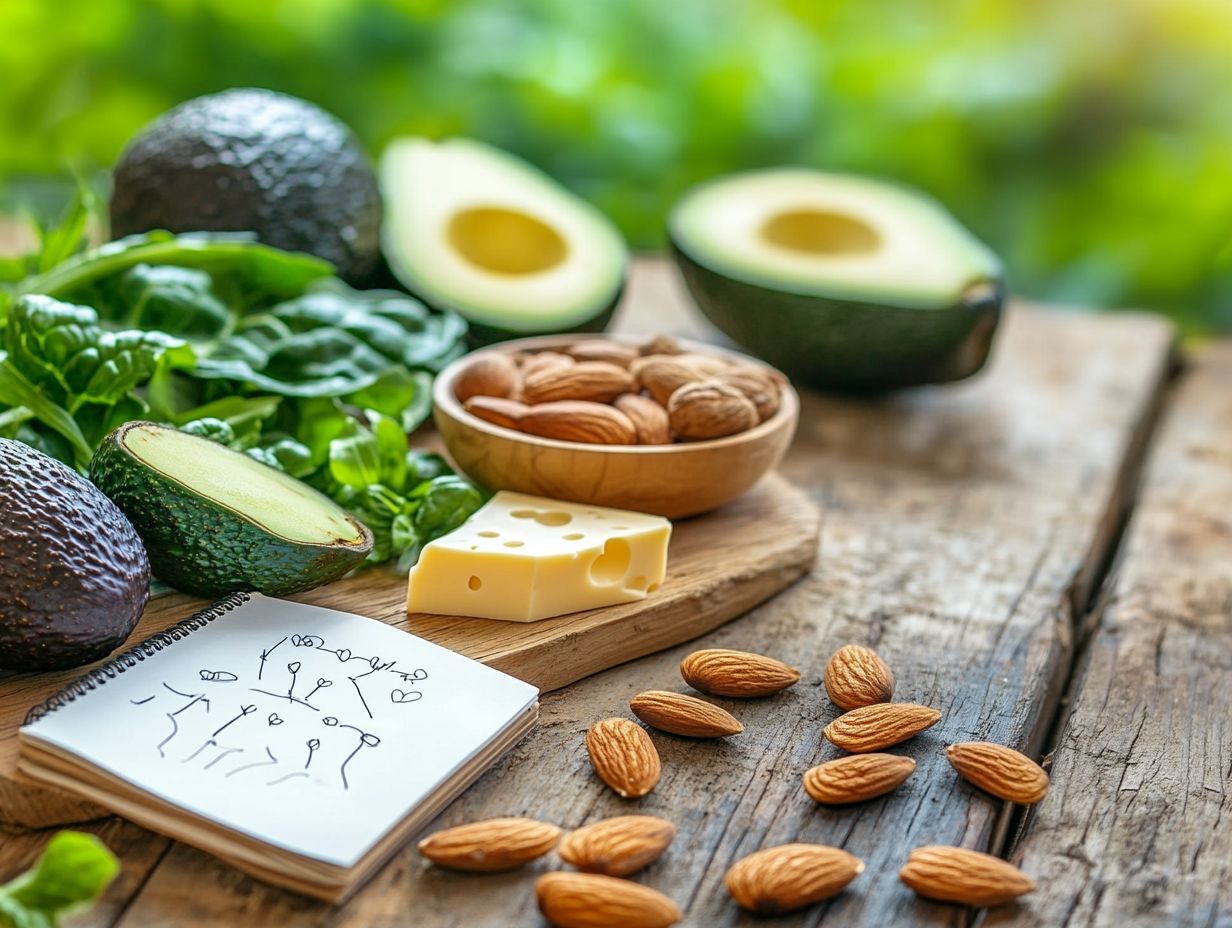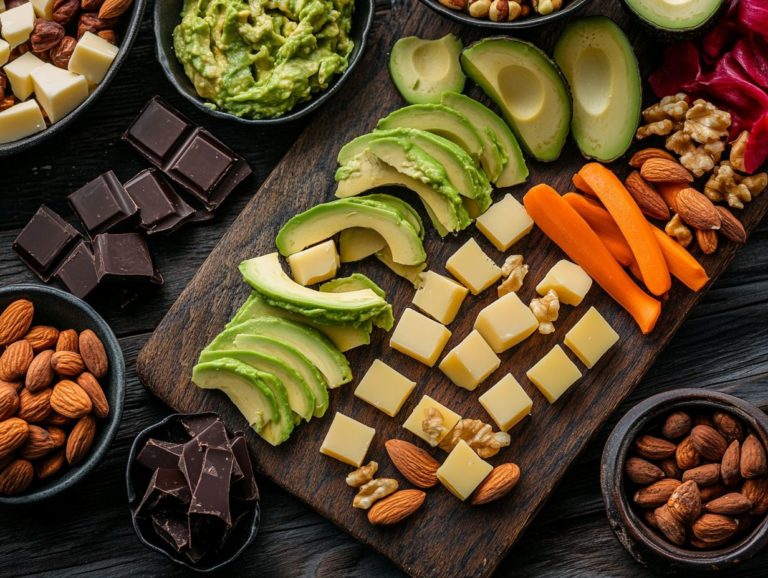Keto Diet FAQs: Myths and Facts Explored
Discover how this diet can transform your health! The Keto diet has surged in popularity as a low-carb, high-fat eating approach that promises not only weight loss but also a variety of health benefits.
But what is it, and how does it actually work? This diet could lead to potential improvements in mental clarity, diabetes management, and heart health.
This article delves into the science behind the Keto diet and its many advantages. It also tackles common myths, potential side effects, and essential tips for anyone like you who is considering embarking on this dietary journey.
Contents
- Key Takeaways:
- What is the Keto Diet?
- How Does the Keto Diet Work?
- What Are the Benefits of the Keto Diet?
- What Are the Common Myths About the Keto Diet?
- What Are the Potential Side Effects of the Keto Diet?
- What Is the ‘Keto Flu’ and How Can It Be Managed?
- Can the Keto Diet Cause Digestive Issues?
- Is There a Risk of Kidney Damage on the Keto Diet?
- How Can I Get Started on the Keto Diet?
- Frequently Asked Questions
- 2. Is the Keto Diet safe?
- 3. Will the Keto Diet make me lose weight?
- 4. Can I eat unlimited amounts of fat on the Keto Diet?
- 5. Is the Keto Diet just another fad diet?
- 6. Are there any potential side effects of the Keto Diet?
Key Takeaways:
- The keto diet can help with weight loss, mental clarity, diabetes management, and heart health.
- The keto diet is safe for most people, but always consult a doctor before starting.
- Possible side effects include the “keto flu” and digestive issues, but these can be managed with a balanced diet.
What is the Keto Diet?
The Keto Diet, often referred to as the Keto diet, is a sophisticated low-carbohydrate eating strategy that aims to transition your body s metabolism from relying on carbohydrates for energy to harnessing fat instead.
Ketosis is when your body starts using fat for energy instead of carbohydrates. This remarkable metabolic state is achieved when you significantly cut back on carbohydrates, prompting your body to burn fat and generate ketone bodies for energy.
Embracing this dietary approach necessitates careful planning and thoughtful food selections, emphasizing high-fat foods, healthy fats, and whole foods to fulfill your nutritional requirements.
How Does the Keto Diet Work?
The Keto Diet functions by significantly lowering your carbohydrate intake, which results in a notable reduction in insulin levels. This prompts your body to enter a metabolic state known as ketosis.
In this state, your body becomes highly skilled at burning fat for fuel instead of carbohydrates. It effectively converts fat into ketone bodies, which act as an alternative energy source. This transformation not only supports weight loss but also improves metabolic health and stabilizes your energy levels throughout the day.
What Are the Benefits of the Keto Diet?
The Keto Diet presents a wealth of health benefits, with one of the most notable being substantial weight loss, thanks to your body s enhanced capacity to burn fat while in ketosis. This dietary strategy sharpens cognitive function and aids in managing diabetes by regulating insulin levels, thereby promoting overall metabolic health.
Incorporating heart-healthy fats into your meals supports cardiovascular health, making this diet a compelling option for individuals with distinct dietary requirements.
Does the Keto Diet Really Help with Weight Loss?
The Keto Diet has proven to be an effective strategy for weight loss. It encourages your body to utilize fat as its main source of energy instead of carbohydrates. This metabolic shift, combined with a decrease in calorie intake from carbs, can lead to significant fat loss.
You may find that your energy levels remain steady while your hunger diminishes, making it easier to stick to your dietary changes and achieve long-term results.
Research suggests that ketogenic diets can yield greater weight reduction compared to low-fat diets in certain cases. Studies indicate that participants often lost more weight over a 24-week period, largely due to increased fat oxidation, which efficiently taps into body fat for energy.
However, individual outcomes can differ based on various factors, including how closely you adhere to the diet, your metabolic variations, and any underlying health conditions. For instance, those with metabolic disorders may experience different results compared to the general population, highlighting the importance of tailoring dietary approaches to fit personal needs.
Can the Keto Diet Improve Mental Clarity?
Many individuals report experiencing enhanced mental clarity and cognitive function while on the Keto Diet. Your brain can utilize ketone bodies as a reliable energy source, leading to improved focus and mental sharpness, especially for those who often face energy crashes from high-carb diets.
As your body transitions from glucose to fat metabolism, ketones serve as a steady fuel for your brain. This shift significantly enhances cognitive processes. Research indicates that ketone bodies not only improve energy efficiency but also offer neuroprotective benefits, potentially lowering the risk of neurodegenerative diseases.
Countless testimonials highlight experiences of sharper thinking, improved memory retention, and greater productivity since adopting this dietary approach. Studies suggest that the anti-inflammatory properties of ketones may play a role in these cognitive benefits. This reveals a fascinating interplay between diet and mental health that deserves further investigation.
Does the Keto Diet Help with Diabetes Management?
The Keto Diet can significantly influence diabetes management, especially for those with Type 2 diabetes. By lowering insulin levels and promoting weight loss, this dietary approach encourages stable blood sugar levels and can even reduce reliance on medications in some cases.
Research shows that adopting a ketogenic lifestyle can improve insulin sensitivity, essential for managing blood glucose levels. In fact, the American Diabetes Association suggests that cutting back on carbohydrates might lead to better glycemic control.
If you re considering this diet, consult with healthcare professionals. Personalized guidance can help tailor this approach to your specific needs and address any potential health concerns, ensuring safe and effective diabetes management.
Experience the Remarkable Power of the Keto Diet to Transform Your Heart Health!

The Keto Diet has remarkable potential for enhancing your heart health. It embraces heart-healthy fats, such as the unsaturated fats present in avocados and olive oil, while reducing dependence on high-carb foods that can spike blood sugar levels.
By shifting your dietary habits towards a high-fat, low-carb approach, you may significantly improve your overall metabolic health and diminish cardiovascular risks.
This dietary strategy promotes weight loss and plays a vital role in managing cholesterol levels. Numerous studies suggest that following the Keto Diet can elevate HDL (the good cholesterol) and decrease triglycerides. Both are advantageous for your cardiovascular well-being. Experts contend that lowering carbohydrate intake helps combat insulin resistance, a key factor in heart disease.
Incorporating omega-3 fatty acids, often found in fatty fish, may offer further protective benefits for your heart. This reinforces the connection between a ketogenic lifestyle and enhanced vascular health.
What Are the Common Myths About the Keto Diet?
Despite its widespread popularity, numerous dietary myths about the Keto Diet continue to circulate. One common misconception is that it is inherently unhealthy because of its emphasis on high-fat foods.
Critics frequently voice concerns regarding potential health risks linked to reduced carbohydrate intake and dietary restrictions. This can lead to a misunderstanding of the fundamental principles that underpin the ketogenic diet.
Start your journey today to enjoy the incredible mental clarity, diabetes management, and heart health benefits that the Keto Diet offers!
Is the Keto Diet Only for Weight Loss?
While the Keto Diet often garners attention for its impressive weight loss results, its benefits extend far beyond the scale. Many individuals choose the ketogenic approach for a myriad of health advantages.
Cognitive Benefits
The ketogenic diet can enhance cognitive function. Research indicates that adopting a low-carbohydrate, high-fat diet can lead to significant improvements in mental clarity and focus. This is due to the brain s remarkable ability to utilize ketones a type of energy produced when the body uses fat for fuel as an efficient energy source.
This cognitive boost is especially advantageous for anyone grappling with brain fog or experiencing age-related cognitive decline.
Health Condition Management
The Keto Diet can help stabilize blood sugar levels. This makes it an attractive option for those managing type 2 diabetes or insulin resistance. Studies also suggest that this dietary approach may contribute to cardiovascular health and could assist in the management of epilepsy and other neurological disorders, highlighting its versatile role in promoting overall well-being.
Is the Keto Diet High in Cholesterol?
One common misconception is that the Keto Diet will send your cholesterol levels skyrocketing due to an increase in high-fat foods. However, many studies suggest that the quality of the fats you consume especially those unsaturated gems plays a pivotal role in maintaining heart health.
Research shows that swapping out saturated and trans fats for healthier alternatives, like avocados, nuts, and olive oil, positively impacts your cholesterol profile. For example, a meta-analysis published in the American Journal of Clinical Nutrition revealed that participants who embraced a higher intake of monounsaturated fats saw a reduction in low-density lipoprotein (LDL) cholesterol, often dubbed the ‘bad’ cholesterol.
This evidence highlights the importance of focusing on the types of fats in your diet. By opting for more nutritious fat sources, you can achieve favorable outcomes for your cardiovascular health. It s a powerful reminder that not all dietary fats are created equal.
Does the Keto Diet Cause Nutrient Deficiencies?
One concern often raised about the Keto Diet is the risk of nutrient deficiencies stemming from its stringent dietary restrictions, particularly regarding fiber sources and essential vitamins. However, with meticulous planning and a focus on whole foods, you can successfully maintain a balanced intake of nutrients.
To prevent these deficiencies, prioritize a diverse array of low-carb vegetables, such as leafy greens, broccoli, and bell peppers. These are brimming with essential vitamins and minerals. Incorporating healthy fats like avocados, nuts, and seeds not only elevates the flavor of your meals but also enhances nutrient absorption.
Don t risk deficiencies plan your meals wisely! It might also be wise to consider supplementation for specific nutrients, such as magnesium or potassium, particularly if your dietary choices are lacking.
By adopting a well-rounded approach through meal planning think batch cooking and keeping a variety of keto-friendly foods at the ready you can seamlessly adhere to this lifestyle while ensuring your body receives the necessary nutrients it craves.
Is the Keto Diet Safe for Everyone?
While the Keto Diet may be safe for many, it might not be the right fit for you, especially if you have specific health conditions or dietary needs. Consulting with a registered dietitian is essential to evaluate your health and ensure that the diet aligns with your individual goals and safety.
If you have diabetes, particularly if you re on insulin, approach the Keto Diet with caution due to the potential for blood sugar fluctuations. Individuals with liver or kidney diseases might encounter complications, as the diet s high fat content can put additional stress on these organs. Pregnant or breastfeeding women, along with those who have a history of eating disorders, should also seek customized dietary guidance before making any significant changes.
Understanding your personal health conditions and obtaining professional advice is crucial for navigating dietary changes and maintaining your overall well-being.
What Are the Potential Side Effects of the Keto Diet?
While the Keto Diet can provide a wealth of health benefits, it is crucial to recognize the potential side effects that some people may encounter, especially during the early stages of this dietary transition.
Dubbed the ‘keto flu’, these unwelcome symptoms can manifest as fatigue, headaches, and irritability, as your body adapts to its new source of fuel.
What Is the ‘Keto Flu’ and How Can It Be Managed?

The term ‘keto flu’ refers to a set of symptoms that you might encounter in the early stages of the Keto Diet. Symptoms like fatigue, headaches, dizziness, and irritability can arise as your body adjusts to a significant reduction in carbohydrate intake. You can manage these symptoms with adequate hydration and a focus on maintaining your balance of minerals in your body.
Along with fatigue and irritability, you may also find yourself grappling with brain fog, muscle cramps, and nausea as your body transitions into ketosis. To ease these challenges, consider implementing gradual dietary changes. Instead of slashing carbs all at once, try reducing them slowly over a few weeks. This method can significantly smooth the adjustment process.
Staying well-hydrated is essential, as your body often sheds more water and electrolytes during the initial phase of the diet. Incorporating foods rich in potassium, magnesium, and sodium can further help ensure a more seamless transition and minimize the risk of those pesky flu-like symptoms.
Can the Keto Diet Cause Digestive Issues?
You may find that some digestive issues crop up when you start the Keto Diet, largely due to the significant shifts in your dietary fiber intake and the types of foods you’re consuming. These issues might manifest as constipation, diarrhea, or bloating, often stemming from insufficient fiber sources in your meals.
To keep your digestive health in check while embracing a ketogenic lifestyle, it’s essential to proactively incorporate suitable fiber-rich foods into your diet. Think avocados, nuts, and low-carb vegetables these can work wonders for your gut. Transitioning gradually to a lower-carb diet is also advisable; this allows your digestive system to adapt more seamlessly.
Increasing your water intake can be beneficial, as it aids digestion and helps prevent constipation. You might also want to consider friendly bacteria supplements or foods like sauerkraut, which can support gut health and foster a balanced microbiome, promoting overall well-being during your dietary transition.
Is There a Risk of Kidney Damage on the Keto Diet?
Concerns about potential kidney damage from the Keto Diet often surface due to its focus on higher protein intake. While there s minimal evidence suggesting the diet poses a risk to healthy individuals, if you have kidney issues, it is important to consult your doctor before embarking on significant dietary changes.
The relationship between protein intake and kidney health is anything but straightforward; excessive protein consumption can increase the workload on the kidneys, especially for those already dealing with renal issues. It is crucial for individuals at risk, such as those with chronic kidney disease, to be vigilant about their dietary choices. Personalized dietary advice that considers your specific health needs can be instrumental in managing kidney health while still ensuring you receive adequate nutrition.
Adopting a more balanced approach to protein intake mindful of both sources and overall dietary patterns can help mitigate potential risks while preserving essential nutrients.
How Can I Get Started on the Keto Diet?
Embarking on the Keto Diet requires you to make intentional dietary adjustments that center around minimizing carbohydrate intake while enhancing your consumption of healthy fats and sufficient protein.
A well-crafted eating plan should feature a diverse array of food options, highlighting whole foods, nutritious fats, and low-carb vegetables and fruits to guarantee a well-rounded nutritional profile. Start your keto journey today with these simple steps!
What Foods Should I Eat on the Keto Diet?
On the Keto Diet, you should prioritize whole foods that are abundant in healthy fats. Focus on foods like avocados, olive oil, nuts, seeds, and fatty fish. Incorporate low-carb vegetables such as spinach and broccoli as well. Don’t forget to include adequate protein sources to keep your meals balanced.
Incorporating nutrient-dense options like grass-fed meats, eggs, and full-fat dairy can elevate your meal plan while enhancing satiety. These foods are packed with essential vitamins and minerals that support your overall health.
When it comes to cooking, use herbs and spices to spice up your meals. They make your dishes delicious without adding carbs. Preparing dishes in bulk not only saves you time on busy days but also lets you enjoy the flavors you’ve created. Techniques like roasting or grilling can enhance the natural goodness of your vegetables.
And let s not overlook the power of high-fiber foods like chia seeds or flaxseeds. These options support your digestive health and help maintain balanced blood sugar levels.
What Foods Should I Avoid on the Keto Diet?
To successfully adhere to the Keto Diet, you must avoid foods that are high in carbohydrates. These can obstruct your journey into ketosis. This means steering clear of sugary snacks, grains, starchy vegetables, and many processed foods. Such foods can disrupt your carbohydrate intake and sabotage your overall dietary goals.
Focusing on carbohydrate content is essential for maintaining your body’s metabolic state, which helps your body burn fat effectively. For instance, foods like bread, pasta, and rice are notoriously high in carbs and can quickly spike your insulin levels, making it challenging to achieve that coveted state of ketosis.
Moreover, even seemingly healthy options like certain fruits and legumes can harbor hidden sugars that threaten to derail your progress. It s crucial to be vigilant about your food choices and prioritize low-carb alternatives to fully enjoy the benefits this diet offers.
How Can I Maintain a Balanced Diet on the Keto Diet?
Maintaining a balanced diet while following the Keto Diet requires thoughtful planning and a keen focus on nutrient density. By incorporating a diverse array of food choices, including vibrant vegetables, healthy fats like avocados and olive oil, and quality protein sources, you can achieve this delicate balance.
To enhance your Keto journey, integrate meal prepping into your weekly routine. Preparing meals in advance saves you precious time and significantly reduces the temptation to indulge in non-compliant foods on hectic days. Focus on whole foods and fiber sources like flaxseed to help manage your carbohydrate intake.
Engaging in mindful eating practices such as tuning into your hunger cues and savoring each bite can enhance your satisfaction while adhering to the diet. It’s important to rotate your food options to keep things exciting and ensure you access a broader spectrum of nutrients and flavors. This can also aid in maintaining metabolic health.
If you’re seeking tailored advice to navigate potential challenges, consult with a registered dietitian. They can offer personalized strategies that support your health and well-being on the Keto path. Professionals like Audrey Fleck and Jill Gulotta can provide invaluable insights to optimize your diet.
A brief video explaining key concepts of the Keto Diet:
Frequently Asked Questions

1. What exactly is the Keto Diet?
The Keto Diet, also known as the ketogenic diet, is a low-carbohydrate, high-fat diet that forces the body to burn fat for energy instead of carbohydrates. It is designed to put the body in a metabolic state of ketosis, where it produces ketone bodies as an alternative source of energy.
2. Is the Keto Diet safe?
Yes, the Keto Diet can be safe if followed correctly. However, it may not be suitable for everyone, especially those with certain medical conditions like Type 2 Diabetes or liver disease. It is always best to consult with a healthcare professional before starting any new diet.
Institutions like the Mayo Clinic and Johns Hopkins Medical Center provide guidelines on managing health risks associated with the diet.
3. Will the Keto Diet make me lose weight?
Absolutely! The Keto Diet is a powerful way to shed those extra pounds because it restricts carbohydrates.
This leads to a decrease in insulin levels and an increase in fat burning. However, weight loss results may vary depending on individual factors such as metabolism and activity level. For long-term results, it’s important to maintain a balanced eating plan and consider periodic keto cycling, which means alternating between periods of strict keto and higher carb days.
4. Can I eat unlimited amounts of fat on the Keto Diet?
No, it is important to still maintain a balance by eating fewer calories than you burn in order to lose weight on the Keto Diet.
While fat is a major source of energy on this diet, it is crucial to consume it in moderation and focus on healthy sources such as avocados, nuts, and olive oil. Incorporating unsaturated fats and other heart-healthy fats is vital for balanced nutrition.
5. Is the Keto Diet just another fad diet?
No, the Keto Diet has been around for decades and has been used to treat medical conditions such as epilepsy.
It has gained popularity in recent years as a weight loss tool, but it is not a quick fix or a fad diet. It is a sustainable lifestyle change for many people. Everyday Health and the American Diabetes Association have published articles debunking common dietary myths regarding this diet.
6. Are there any potential side effects of the Keto Diet?
Are you curious about the potential side effects of the Keto Diet? Some people might experience symptoms like fatigue, headaches, and nausea when they first start. This is often referred to as the “Keto flu.” Thankfully, these symptoms usually go away after a few days as your body adjusts.
Staying hydrated and consuming enough electrolytes is key. Consider dietary supplements to help manage any unwanted symptoms. Staying aware of these unwanted symptoms can help you manage your personal health better.






